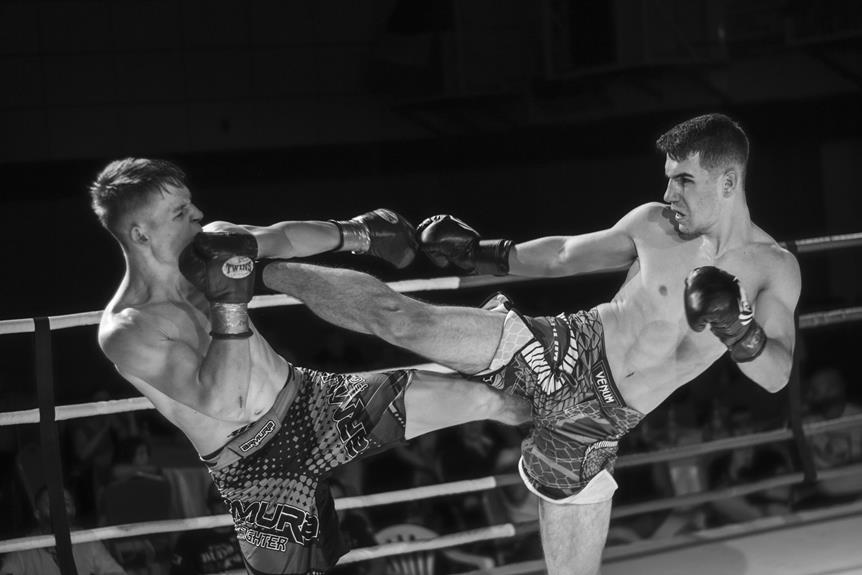In the world of mixed martial arts, height often plays a crucial role in a fighter's strategy and style. However, the Ultimate Fighting Championship (UFC) has witnessed remarkable success stories from fighters who defy conventional expectations.
From the exhilarating flyweight division to the heavyweight battles, this article delves into the achievements of the 15 shortest UFC fighters, both male and female.
Discover the exceptional skills of these athletes and witness firsthand how their mastery of the sport transcends physical stature.
Key Takeaways
- The shortest male UFC fighter is Demetrious Johnson, who stands at 5'3" tall.
- The shortest female UFC fighter is Jessica Andrade, who stands at 5'1" tall.
- The heavyweight division has some of the tallest fighters, with Stefan Struve being the tallest at 7' tall.
- Demetrious Johnson is not only the shortest male UFC fighter, but he is also the shortest UFC flyweight champion at 5'3" tall.
Shortest Male UFC Fighters
The shortest male UFC fighters include Demetrious Johnson, John Lineker, Joseph Benavidez, Henry Cejudo, and Ian McCall. These fighters may not have the height advantage compared to their opponents, but they have proven that size doesn't always determine success in the Octagon.
When comparing them to the tallest fighters in the UFC, such as Stefan Struve and Semmy Schilt, it is clear that height can have a significant impact on fighting style. Taller fighters often have a longer reach, allowing them to strike from a distance and maintain distance.
However, shorter fighters like Johnson and Lineker have developed their own unique fighting styles that rely on speed, agility, and close-quarter combat. They excel at getting inside the range of their opponents and utilizing their strength and technique to overcome any height disadvantage.
Shortest Female UFC Fighters
Among the shortest female UFC fighters are Jessica Andrade, Karolina Kowalkiewicz, Joanna Jedrzejczyk, Michelle Waterson, and Rose Namajunas. These fighters may be shorter in stature, but they have proven themselves to be formidable competitors in the octagon. Despite their height disadvantage, they have showcased exceptional skills, determination, and resilience.
- Jessica Andrade: Standing at 5'1' tall, Andrade is known for her aggressive fighting style and powerful striking.
- Karolina Kowalkiewicz: At 5'3' tall, Kowalkiewicz is a technical striker with a well-rounded skill set.
- Joanna Jedrzejczyk: Standing at 5'6' tall, Jedrzejczyk is a former strawweight champion known for her impressive striking and relentless pace.
- Michelle Waterson: At 5'3' tall, Waterson, also known as 'The Karate Hottie,' possesses a diverse skill set and is known for her slick submissions.
These fighters prove that height is not the sole determinant of success in the UFC, and their performances inside the cage have earned them respect and admiration from fans around the world.
Shortest Fighters in the Heavyweight Division
Stefan Struve, Semmy Schilt, Gan McGee, Zuluzinho, and Hong Man Choi are some of the shortest fighters in the heavyweight division. While the heavyweight division is typically dominated by fighters who are tall and possess tremendous power, there have been a few exceptions when it comes to height. These fighters may not tower over their opponents, but they have proven that size doesn't always determine success in the octagon.
To provide a visual representation of the shortest fighters in the heavyweight division, the following table showcases their height:
| Fighter | Height |
|---|---|
| Stefan Struve | 7' |
| Semmy Schilt | 6'11' |
| Gan McGee | 6'10' |
| Zuluzinho | 6'7' |
| Hong Man Choi | 7'2' |
Although they may not be the tallest fighters in the division, these athletes have shown their resilience and skill inside the cage. It goes to show that in the world of mixed martial arts, height isn't always the determining factor for success.
Shortest Fighters in the Light Heavyweight Division
Five fighters in the light heavyweight division stand out as the shortest in terms of height. These fighters include Jon Jones, Thiago Santos, Dominick Reyes, Anthony Smith, and Jan Blachowicz. Despite their shorter stature compared to other fighters in the division, these athletes have proven themselves to be formidable competitors.
Jon Jones, for example, is widely regarded as one of the greatest light heavyweight fighters of all time, with an impressive record and a versatile fighting style that combines striking and grappling techniques.
Thiago Santos is known for his knockout power and aggressive fighting style, while Dominick Reyes has showcased his athleticism and technical skills in the octagon.
Anthony Smith and Jan Blachowicz have also displayed their abilities, with Smith's submission game and Blachowicz's striking prowess.
While height may play a factor in some matchups, these fighters have demonstrated that skill and technique can overcome any physical disadvantage.
Shortest Fighters in the Middleweight Division
Four fighters in the middleweight division stand out as the shortest in terms of height. Israel Adesanya and Yoel Romero, both standing at 6 feet tall, are the shortest fighters in the division.
Adesanya, the current middleweight champion, has utilized his height disadvantage by relying on his exceptional striking skills and fluid movement. Romero, known for his explosive athleticism and powerful wrestling, has also shown that height is not a determining factor in his success.
When comparing the heights of the shortest male and female UFC champions, it is interesting to note that the shortest male champion, Demetrious Johnson, stands at 5'3', while the shortest female champion, Carla Esparza, is 5'1' tall.
This highlights the diversity in body types and the importance of skill and technique in the sport of mixed martial arts.
Shortest Fighters in the Welterweight Division
Highlighting the height diversity in the welterweight division, the shortest fighters in this weight class possess a range of skills and techniques. Despite their shorter stature, these fighters have proven themselves to be formidable competitors in the octagon.
Here are some key points to consider regarding the impact of being short in the UFC welterweight division:
- Impact on fighting style: Shorter fighters often rely on their speed, agility, and quick reflexes to make up for their lack of reach. They may excel in close-range combat, utilizing their compact frame to deliver powerful strikes and takedowns.
- Advantages of being short: Shorter fighters have a lower center of gravity, which can provide them with enhanced balance and stability. They may also possess greater natural strength, allowing them to generate significant power in their strikes.
- Disadvantages of being short: The main disadvantage of being short in the welterweight division is the reach disadvantage. Taller opponents may have a longer reach, making it challenging for shorter fighters to close the distance and land effective strikes.
Shortest Fighters in the Lightweight Division
The Lightweight division in the UFC showcases some of the shortest fighters in the organization. While height disadvantages can pose challenges for these fighters, they often compensate with their speed, agility, and technical skills.
Shorter fighters in the lightweight division have to rely on their ability to close the distance quickly and avoid being caught at the end of their opponent's reach. They often employ a high-pressure fighting style, constantly moving forward and applying relentless pressure to disrupt their opponent's rhythm.
Additionally, shorter fighters tend to have a lower center of gravity, which allows them to excel in grappling exchanges and takedowns. These fighters also utilize head movement and footwork to evade strikes and counter effectively.
Despite their height disadvantage, they prove that size does not always determine success in the Lightweight division.
Shortest Fighters in the Featherweight Division
One of the shortest fighters in the Featherweight Division is Brian Ortega, standing at 5'8' tall. While not the shortest, Ortega is still considered relatively compact compared to some of his taller opponents.
However, height is not always indicative of success in the UFC featherweight division. Fighters like Max Holloway, Alexander Volkanovski, and Zabit Magomedsharipov have proven that skill and technique can overcome any physical disadvantages.
It is worth noting that the shortest female featherweight UFC fighters also display incredible talent and resilience. Fighters like Amanda Nunes, who stands at 5'8' tall, have dominated the division with their skill set, proving that size does not always determine success in the cage.
In the featherweight division, it is the combination of technique, strategy, and heart that truly counts.
Shortest Fighters in the Bantamweight Division
While some of the shortest fighters in the Bantamweight Division have proven their abilities in the octagon, their height does not determine their success in the UFC. In fact, many of these fighters have found ways to compensate for their height disadvantage and succeed against taller opponents.
One way they do this is by relying on their exceptional skill sets. Shorter fighters often possess superior speed, agility, and technique, which allows them to navigate around their opponents and land effective strikes. They also tend to have a lower center of gravity, making it harder for taller fighters to take them down.
Additionally, shorter fighters in the bantamweight division have learned to adapt their fighting styles to their shorter reach. They often employ strategies that involve getting in close and utilizing their quickness to overwhelm their opponents.
Shortest Fighters in the Flyweight Division
Among the shortest fighters in the Flyweight Division, Deiveson Figueiredo and Brandon Moreno have showcased their exceptional skills and resilience inside the UFC octagon. Despite their relatively shorter stature, both fighters have proven that height is not the sole determining factor for success in the flyweight division.
Discussion ideas:
- Analyzing the height advantage in the flyweight division:
- While taller fighters may have a reach advantage, shorter fighters like Figueiredo and Moreno have demonstrated their ability to close the distance and utilize their speed and agility to their advantage.
- Height may offer certain advantages in terms of striking range, but it does not guarantee victory in the flyweight division.
- The impact of height on fighting style in the flyweight division:
- Shorter fighters often rely on their quick footwork and compact striking techniques to overcome the reach disadvantage.
- They may also utilize their lower center of gravity to excel in grappling exchanges and transitions.
Shortest Male UFC Champions
Despite their shorter stature, Demetrious Johnson, Dominick Cruz, Eddie Alvarez, TJ Dillashaw, and Conor McGregor have all achieved the title of shortest male UFC champions.
Standing at 5'3' tall, Demetrious Johnson holds the distinction of being the shortest male UFC champion in history. Johnson dominated the flyweight division, successfully defending his title a record-breaking 11 times.
Dominick Cruz, at 5'8' tall, is another notable champion in the bantamweight division. Cruz's unorthodox footwork and striking style made him a formidable opponent.
Eddie Alvarez, TJ Dillashaw, and Conor McGregor, all standing at 5'9' tall, have also secured championship gold in their respective divisions.
It is interesting to note the height comparison between the shortest male and female fighters in the UFC, highlighting the diversity and skill present in the sport.
Shortest Female UFC Champions
The shortest female UFC champions in history have showcased their exceptional skills and determination inside the Octagon. Despite their height disadvantage, these fighters have proven that size does not always determine success in the sport of mixed martial arts. Here are four key points highlighting the impact of height on fighter performance:
- Skill and technique: Being shorter does not necessarily mean a fighter lacks the necessary skills to compete at the highest level. Short champions like Zhang Weili and Rose Namajunas have demonstrated their technical prowess and ability to outsmart their opponents.
- Speed and agility: Shorter fighters often possess greater speed and agility due to their lower center of gravity. This advantage allows them to move swiftly, change directions, and launch quick attacks, catching their taller opponents off guard.
- Power and explosiveness: Despite their smaller stature, shorter fighters can generate significant power and explosiveness in their strikes. Carla Esparza, for example, has showcased her explosive takedowns and ground-and-pound, which have been instrumental in her championship success.
- Adaptability and strategy: Shorter fighters are forced to adapt their fighting style and develop effective strategies to overcome the reach disadvantage. They often excel at getting inside the range of taller opponents, utilizing their close-quarter techniques and relentless pressure to nullify the reach advantage.
These shortest female UFC champions have proved that height is not always the decisive factor in determining success in the Octagon. Instead, it is their skill, speed, power, and adaptability that have propelled them to championship glory.
Shortest Fighters in UFC History
Shortest fighters in UFC history have defied expectations and showcased their skills and determination in the Octagon. From the flyweight division to heavyweight, there have been fighters who have overcome their height disadvantage to achieve success in the world's premier mixed martial arts organization.
Demetrious Johnson, standing at 5'3', holds the distinction of being the shortest male UFC champion. Among the female fighters, Carla Esparza, Zhang Weili, and Nicco Montano, all measuring around 5'4', have also been crowned as the shortest UFC champions.
These fighters prove that size is not the sole determinant of success in the UFC, as they have utilized their speed, technique, and mental fortitude to overcome taller opponents. Their performances serve as inspiration to all aspiring fighters, highlighting the importance of skill and heart in achieving greatness inside the Octagon.
Shortest Fighters in UFC History (Male)
Among the various weight divisions in the UFC, there have been several male fighters who have stood out as the shortest in the history of the organization. These fighters have defied their height disadvantage and showcased their skills inside the Octagon. Here are four of the shortest male fighters in UFC history:
- Hector Sandoval: Flyweight (125 lbs), 52' (157.48 cm) height
- Antonio Banuelos: Bantamweight (135 lbs), 53' (160 cm) height
- Daniel Teymur: Featherweight (145 lbs), 55' (165.1 cm) height
- Dennis Bermudez: Lightweight (155 lbs), 56' (167.64 cm) height
These fighters have proven that size is not always the determining factor in combat sports. Despite their shorter stature, they have displayed exceptional technique, speed, and tenacity. Their performances serve as a testament to the diversity and talent within the UFC, as fighters of all shapes and sizes can achieve success in the sport.
Shortest UFC Flyweight Champions
In addition to the previously mentioned shortest fighters in UFC history, there have been individuals who have achieved the title of UFC Flyweight Champion despite their smaller stature. The shortest male UFC Flyweight Champion to date is Demetrious Johnson, standing at 5'3' tall.
When comparing the height differences between the shortest male and female UFC fighters, it is interesting to note that the shortest female UFC fighters, such as Jessica Andrade and Carla Esparza, range from 5'1' to 5'6' tall. This shows that while the male flyweight champions tend to be shorter, the height distribution among the female fighters is more varied.
Analyzing the height distribution among UFC flyweight champions, it is clear that height does not necessarily determine success in this weight class, as fighters of various heights have claimed the title.
Is There a Correlation Between Height and Age in UFC Fighters?
Researchers have analyzed the data to investigate the potential relationship between height and age in UFC fighters. Interestingly, it was found that the average age of ufc fighters in top 15 divisions does not significantly correlate with their height. This suggests that height does not necessarily decline with age in this competitive martial arts realm.
Conclusion
In conclusion, the world of the UFC has proven time and time again that height is not the determining factor for success in the octagon. From male to female fighters, across various divisions and weight classes, these remarkable athletes have defied expectations and showcased their skills and determination.
They have proven that size does not define their abilities, much like a small but mighty flame that can ignite a roaring fire.
- 15 Best Martial Arts Weapons (Fighting & Training) - October 14, 2024
- Is Fencing a Martial Art? (Yes, 4 Reasons Why) - October 14, 2024
- 7 Best Martial Arts for Self-defense Ranked (Highly Effective) - October 14, 2024










